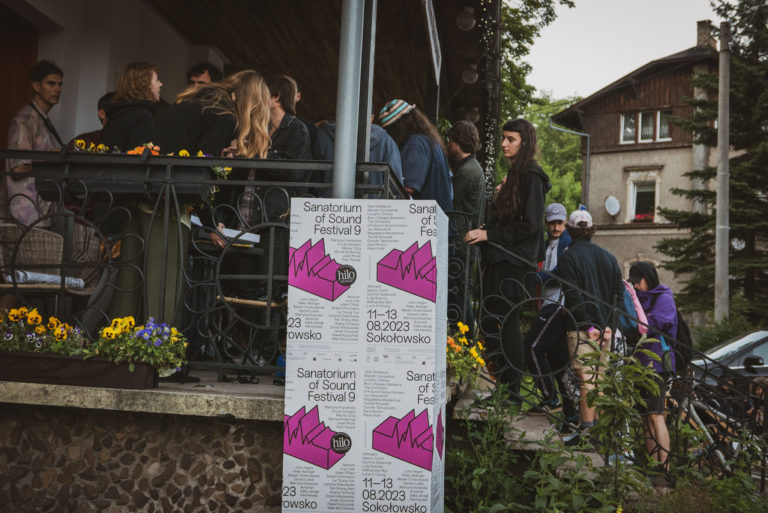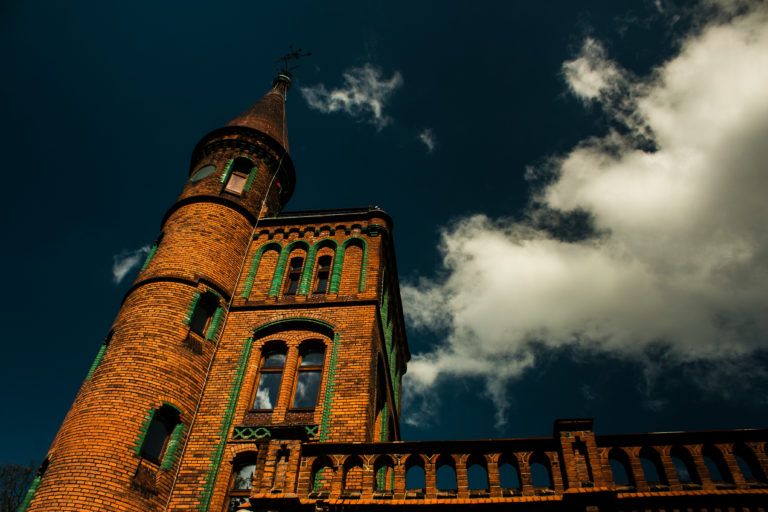Author: Laurent Bigarella
In this interview, Ella Overkleeft, founder of Rural Radicals, discusses her mission to transform overlooked rural areas into spaces of creativity and community. Addressing the imbalances between urban and non-urban cultural representation, she shares insights on the challenges faced by rural creative spaces, the importance of visibility and collaboration, and how initiatives like Rural Radicals are fostering empowerment and cultural dynamism beyond city limits.

Kino Zdrowie from Ulica Glowna – © Tomek Ogrodowczyk
Laurent Bigarella: You are the founder of Rural Radicals, a project dedicated to empower non-urban creative spaces and communities. How does your mission intersect with addressing imbalances in the representation of territories within the broader cultural field, particularly in regions less central to urban cultural hubs?
Ella Overkleeft: The mission of Rural Radicals is to facilitate the transformation of empty buildings into creative spaces of all kinds. The motivation behind the mission is to provide physical and mental space for people to develop their creativity. As this space is lacking in our cities and abundant in our non-urban areas (empty buildings and nature), we want to help creatives and cultural organisations, as well as local communities and other building owners, to create cultural frameworks in the countryside.
In your experience, what challenges do non-urban creative spaces and communities face in gaining visibility and recognition within the cultural landscape, and how does Rural Radicals work to counteract these challenges?
EO: This varies, but from what I've seen so far, it often has to do with the different needs and values of the existing local population and the new, returning or existing younger people who are doing cultural activities in the village/valley, etc. For example, a region in Italy where we've worked is known for its ski resorts, luxurious wellness culture, and 'high' culture such as opera, traditional dances, etc. Young people are leaving the region, causing a 'brain drain', which is a common political issue. There is a lack of spaces for independent culture, and those that do exist are in a precarious situation. It's difficult to be taken seriously, so it goes underground or the struggle is real. Rural Radicals, in collaboration with Space of Urgency, organised a series of meetings that invited the independent scene to one of the established cultural spaces and facilitated exchanges between international speakers and local decision-makers, with a strong emphasis on community building, which is crucial due to the lack of trust that the precarious dynamics create between actors. The outcome of the events is a project proposal to the newly elected officials where we offer clear and feasible solutions to address the major needs of the independent cultural community.

Sanatorium in Sokołowsko – © SchiDD, CC BY-SA 4
Rural Radicals focuses on empowerment. How do you see the role of independent cultural and media structures in supporting and amplifying the voices of non-urban creative spaces and communities?
EO: I think it's all about visibility. Just like representation. People need to see and feel that another reality is possible. Creativity has to be sparked. With Rural Radicals, we see that social media plays an important role in showing examples of people who have walked the path, so that they can inspire others. It is not easy to start a space outside a city. Where? With whom? Who will come? How does it work? There's no manual, you need best practice and you need to hear from other people that it's possible! Now, on a more macro level, it works the same way. If there are articles written about non-urban creative communities, the media will pick it up, research will start, policies can be advocated, changes can be made, and a transition is possible. So, I think it is very important to be vocal, to be visible, and independent media is crucial for that.
How does Rural Radicals contribute to skill development and capacity-building in non-urban areas, and what impact do you hope to achieve in these communities?
EO: Rural Radicals is in its infancy as an organisation, we have a lot to learn ourselves! At the moment we are working with three projects in three different countries. We have accumulated quite a bit of knowledge and are building a database on topics such as 'how to set up a co-working space in a rural area'. This knowledge is transferred directly to these communities on the ground. Another example is sharing the experience of multi-stakeholder collaboration that I have gained in my urban work, but now specialise in for non-urban areas. We are also currently focusing on community exchange through workshops or other sessions at conferences. As I mentioned before, the visibility and exchange of experiences between 1) people who have already started a space and 2) those who want to do so is very valuable and necessary. The impact we aim for is always to add value through arts/culture and social innovation. Rural Radicals is building-based, that is the starting point. Having worked with creative spaces for over 15 years, I can say that transforming buildings into hubs of creativity and community contributes to the wider community on so many levels. From job creation to entrepreneurship, and perhaps most importantly, they provide a sense of solidarity.

Overview of Basis, in Silandro (Italy) and the valley – © Samuel Holzner
Given your dedication to non-urban spaces, how do you approach internationalisation and representation, especially when these areas may face additional barriers compared to urban counterparts?
EO: There are several ways of looking at this. I think it is a fact that non-urban areas are less international, simply because of the geography of some places and the difficulty of getting there. And still most people are interested in cities, not rural areas. That's changing of course, that's one of the reasons why Rural Radicals started; the movement of a different kind of visitor to non-urban areas, the 'Rural Radical' if you like. The non-urban creative space communities are international. Artists in residencies, retreat spaces, etc. But the majority are local, or at least from the same country. Collectives from Paris starting their space in the French countryside or even moving back to the village they come from, I see this a lot in my work. I think that a too big an international community can undermine the authenticity of a local community. For example, I have been to many villages in Portugal and some of them are now over 80% international. It is interesting to note that the intentions of these people are often very different from those of the internationals who come to the cities. They often move to the countryside to create a community based on values that they couldn't find in the city. This is very different from a property speculator buying up blocks of houses. We'll have an article on the Rural Radicals LinkedIn later this year about how 'gentrification' has different connotations depending on the context.
I drifted off there for a second... to come back to the question: about representation. Moving to the country can be seen as a privilege. Unless you burn all your bridges and start from scratch. Anyway, we focus on different financing models to get access to buildings. From 'crowd lending and equity' to 'community interest communities'. There are all these empty buildings in the countryside, but getting access to them is not always easy, and we want to change that.
We are keen to work with communities who want to experiment and use their unused properties for cultural and creative projects.
How can initiatives like Rural Radicals foster open dialogues and collaborations between urban and non-urban communities?
EO: We do this in three ways: 1) via individual projects, in different European countries. By helping them to develop and activate their non-urban spaces we bring in a network of actors, including urban actors that can build relationships and interact with the non-urban space. 2) via our social media platforms, here urban and non-urban initiatives can interact with each other and start collaborations, 3) via the public events we are present at, and both groups can participate in workshops, talks, and other interactive sessions to learn from each other and ignite cooperation. We also bring organisations and institutions from both worlds together in projects and consortia.
Are there specific economic challenges faced by cultural organisations based outside of metropole or any urban context?
EO: Yes, the business models of these spaces are often based on aspects that require people to travel, such as artists in residence. It takes more effort to visit these spaces, which means more risk. There's also less funding available, simply because municipalities or regions have fewer people and therefore less tax revenue, which means less budget. For non-urban spaces, cooperation with other organisations is crucial. Rural areas are now more and more on the political agenda, but often the focus is on agriculture or digitalisation, not culture. That's why at Rural Radicals we focus on culture-led rural development. Otherwise, the challenges are similar to those in urban contexts, because we live in a globalised world.
Looking towards the future, what strategies and initiatives do you envision for Rural Radicals to continue empowering and advocating for non-urban independent cultural spaces and communities, and how can this contribute to a more balanced and representative cultural field?
EO: The main aim is to open up the buildings for these creatives, collectives, etc. We receive many emails from initiatives in different countries, which we try to help as best we can at the moment. But it takes a bigger organisation and resources to serve everyone. We are working on alternative financing models for the purchase of buildings with partners from the property and research sectors. Another avenue we are exploring is the collective building process. We are bringing together architects and eco-social designers who have very innovative ideas about the building process, including value-based and heritage methods. We want our work to have an impact on an individual, social, and universal level, contributing to a society where there is space for human creative development in synergy with nature. As we spread out more across the planet (as opposed to the expected 70% of people living in cities by 2050), we can create a greater balance of equity in our territories in the broadest sense of the word.
Published on December 18th, 2024
About the author:
Laurent Bigarella has been working within the Lyon-based association Arty Farty since 2017 where he holds the position of director of the Ideas Department. He co-coordinates the Reset! network, supported by Creative Europe, which brings together independent cultural and media organisations across Europe. He is also a curator of European Lab, a discourse programme gathering cultural actors in Lyon, Paris, Brussels, and various European cities. He has been involved in other European cooperation projects, such as We are Europe and Sphera.